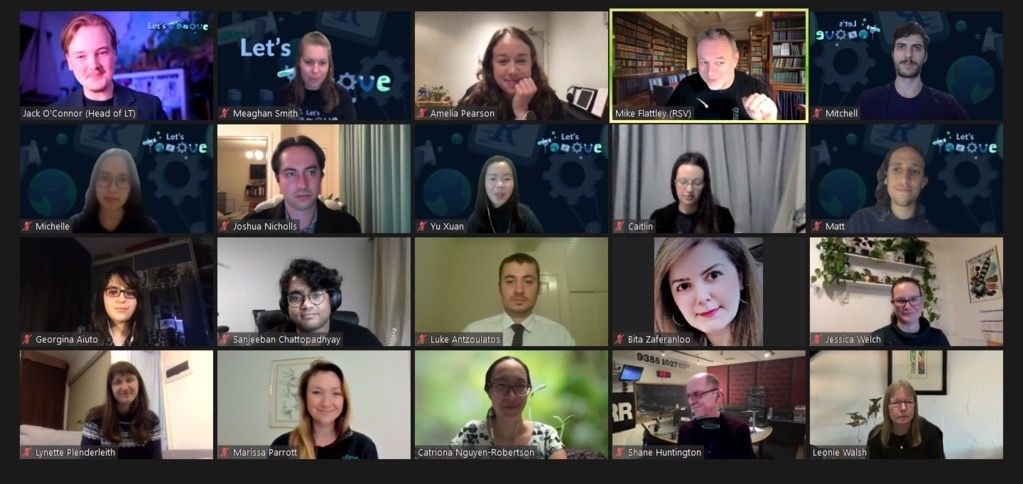Swinburne sweeps Let’s Torque public speaking competition

Let’s Torque was held virtually on 21 August, with Swinburne students winning all three prizes
In summary
- Swinburne students have been awarded the first place, runner up and People’s Choice prizes at the 2021 Let’s Torque state public speaking competition for science communication
- Joshua Nicholls, Sanjeeban Chattopadhyay and Georgina Aiuto delivered four-minute pitches on solving an issue using science
- The students were part of Swinburne’s Shaping STEMM Futures program, initiated and lead by Dr Bita Zaferanloo to improve science communication skills
Swinburne engineering and science students have taken out all of the top prizes at the 2021 Let’s Torque sate-wide public speaking competition.
Let’s Torque was held virtually on 21 August, with participants presenting a four-minute pitch to solve an issue using science.
Joshua Nicholls finished in first place, Sanjeeban Chattopadhyay was awarded runner up and Georgina Aiuto received the ‘People’s Choice’ award. The students qualified for Let’s Torque through the 2020 Start Talking competition, part of Swinburne’s Shaping STEMM Futures initiative.
Swinburne’s Deputy Academic Director of Student Engagement, Dr Bita Zaferanloo, is on the Let’s Torque Advisory Board and facilitated both competitions. She also runs Swinburne’s Communication for Scientists unit.
‘I am so excited that through my initiative, we were able to identify the talented science communicators at Swinburne to go to the next level,’ she says.

First place finisher Joshua Nicholls says units at Swinburne such as Communication for Scientists, taught him how to make an award-winning pitch.
Pitching to solve problems
Joshua Nicholls is in his fifth year at Swinburne, completing the Bachelor of Science and majoring in Biochemistry.
‘It has been my life’s dream to not only be a world-class scientist but a mentor, a teacher, a communicator – someone who can inspire and excite people about science,’ he says.
His pitch ‘Bionics: Seeing into the Future’ suggested using gene cloning and STEM technologies to describe neurological conditions and design drugs. After losing points on communicability in the Start Talking competition, he learnt the important lesson to ‘keep it simple’, which he applied to his pitch at Let’s Torque.
‘It was an absolute privilege even to have been a part of this competition. Coming first place was an added honour and will remain one of the highlights of my life,’ Mr Nicholls says.
Georgina Aiuto is a third year Bachelor of Science (Professional) student majoring in Physics. Her pitch ‘Take a Second for the Future’ was inspired by a lecture advertised through Swinburne’s Physics Club.
Her pitch unpacks the importance of time science and how the progression of devices such as the atomic clock can help reduce the environmental impact of Australian bush fires through GPS technology.
Winning ‘People’s Choice’ was ‘surprising’, says Ms Aiuto. ‘I am super grateful for all the support from my friends and family who jumped in the livestream to watch my performance,’ she says.
Runner Up, Sanjeeban Chattopadhyay, is studying the Bachelor of Engineering (Honours) majoring in Civil Engineering. His pitch ‘Permeable Pavements: A Key Design for a Water-Sensitive' highlights how absorbent pavements can charge soil and redirect water to prevent flooding.

The Swinburne Physics Club helped Georgina Aiuto (bottom right) find her topic for Let’s Torque.
Communication is key
Students participated in workshops at the Royal Society of Victoria and took the Communication for Scientists unit. Mr Nicholls says these classes support students to improve their science communication and presentation skills.
‘Too often in academia, we are used to communicating very abstruse topics using technical jargon for our peers,’ he says.
Dr Zaferanloo says the programs aim to build effective communication skills to reach diverse audiences.
‘The current global pandemic has highlighted the importance of science communication and confirms empowering students with communication skills should be a priority.’
Ms Aiuto developed her research skills during this experience. ‘The workshops for the event were really fun and the Start Talking students and staff were absolutely lovely,’ she says.
Mr Nicholls encourages those interested in science communication to enter future events. ‘If anyone has any desires to get their foot in the door of this field, get your name and face out there and just go for it!’
-
Media Enquiries
Related articles
-

- Technology
- Science
- Engineering
Victorian students drive green energy transition through international hydrogen competition
Swinburne’s KIOSC, in collaboration with Horizon Educational and Gippsland Tech School, co-hosted the Hydrogen Grand Prix in Melbourne.Friday 26 July 2024 -

- Student News
- Film and television
Swinburne students curate "Wrestling with Reality" film season for ACMI's Cinema 3
Students from Swinburne's Cinema and Screen Studies program launch curated film season on ACMI’s streaming platform, Cinema 3.Tuesday 23 July 2024 -

- University
Meet the Swinburne students and alumni at the Paris Olympics and Paralympics
Swinburne students and alumni are making their mark at the 2024 Olympic and Paralympic Games in Paris. Meet the six Swinburne athletes who are taking on the world.
Wednesday 17 July 2024 -

- Student News
Vygo: Support at students’ fingertips
Swinburne University of Technology students will have personalised support and peer-to-peer learning at their fingertips with the new Vygo app.
Thursday 25 July 2024 -

- Science
Skin, scales and fish tails: using collagen to turn fish guts into gold
New research from Swinburne could transform the sector by converting high value collagen proteins from seafood by-products into cosmetics, food, and pharmaceuticals.
Tuesday 02 July 2024

